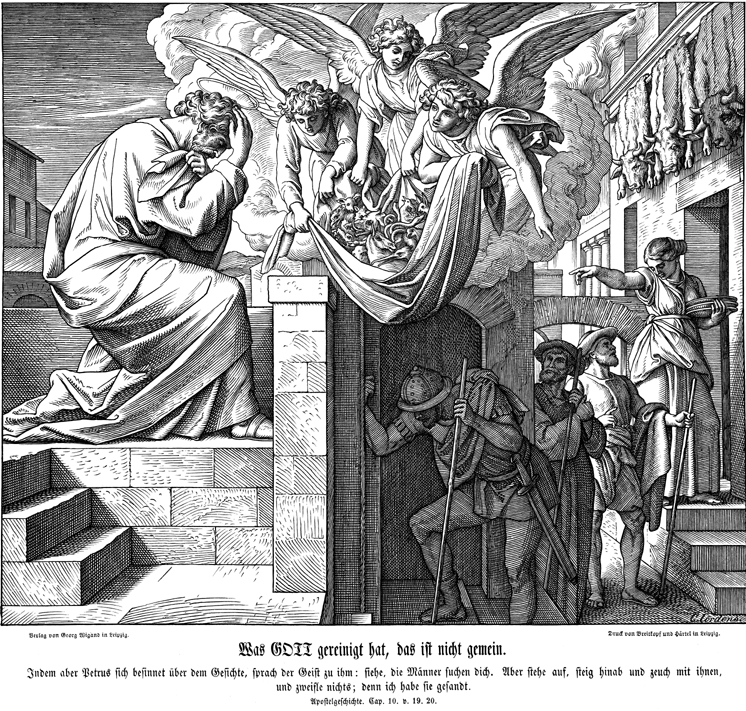Our Leviticus passage is filled with all sorts of seemingly random rules for behavior, covering topics like rules for harvesting, rules for employers, and rules for courts. Leviticus addresses issues of sexual misconduct, farming, fortune telling, personal grooming, tattoos and piercings. Leviticus continues with matters of child sacrifice, respect for the aged, and eating rare meats. These all seem to be a mishmosh of miscellaneous laws, but there are a couple of things that unite them:
The first unifying factor is the concept of separation. Leviticus 19:1-2 says: And the Lord spoke to Moses, saying, 2 “Speak to all the congregation of the people of Israel and say to them, You shall be holy, for I the Lord your God am holy.
 | |
| Child sacrificed on heated metal arms of Molech statue |
The second unifying factor is the concept of justice. Laws regarding farming were really designed to take care of the needs of the poor, and even of the land itself. Many of the sexual laws involved not violating the sanctity of family and neighborly relationships. Treating everyone with equality means that no one person gets preferential treatment. Jesus thought that this was so important that he quoted Leviticus 19:18, "love your neighbor as yourself," as one of the greatest commandments (Mark 12:28-31). Loving your neighbor as yourself means speaking the truth about him, not defrauding him, certainly not offering him up as a human sacrifice. It involves respecting her enough to keep proper sexual boundaries. The word "justice" literally has to do with equality. The image is one of an old-fashioned scale with two arms. Justice means that everything weighs out equally on both sides. This is embodied in 19:36, which says: You shall have just balances, just weights, a just ephah, and a just hin: I am the Lord your God, who brought you out of the land of Egypt. God's desire for his people is that all our relationships be just.
 |
| Necromancer conjures the spirit of Samuel for King Saul (1 Sam 28:3-25) |
All of this is to create a separate culture from the pagan Canaanites who already live in the land. God doesn't want them to be like the unbelievers around them. In fact, it is because of their evil practices that God is driving them out before Israel. Leviticus 20:22-24, 26 says:
22 “You shall therefore keep all my statutes and all my rules and do them, that the land where I am bringing you to live may not vomit you out. 23 And you shall not walk in the customs of the nation that I am driving out before you, for they did all these things, and therefore I detested them. 24 But I have said to you, ‘You shall inherit their land, and I will give it to you to possess, a land flowing with milk and honey.’ I am the Lord your God, who has separated you from the peoples...26 You shall be holy to me, for I the Lord am holy and have separated you from the peoples, that you should be mine.
When you read some of the Old Testament laws that seem random or arbitrary (like how not to trim your beard, or not to get tattoos (By the way, you can click here to read my article, "Is it a Sin to Get Pierced or Tattooed?" ), you have to consider the context and understand what God was trying to do. He was trying to create a culture that was different from that of the Canaanites, because He wanted His people to be holy, separate, distinct.
Christians today need to ask ourselves, in what way have we assimilated into the culture so much that we are no longer holy, separate, and distinct? We are to be in the world, but not of the world. In 1 Peter 2:9 (KJV), God says that we are to be "a peculiar people." Exodus 19:5 (KJV) says we will be a "peculiar treasure unto me above all people." This means that God doesn't want us to assimilate and be just like all the people who live around us. God wants us to be different. Now, Gentiles aren't bound to all the Jewish laws like beard trimming and Kosher foods. But it's not a bad thing to ask yourself whether you're loving your neighbor as yourself, whether you've been religiously unfaithful to God, or whether you've been unjust with your fellow people. Beyond that, you might ask yourself how your ethical, sexual, or religious practices have borrowed too much from the culture around you rather than deriving from God's holy Word. Today, I pray that God will show you how you can be a peculiar person for Him.
May He guide you into all truth.
*Unless otherwise specified all scriptures are taken from the ESV.











